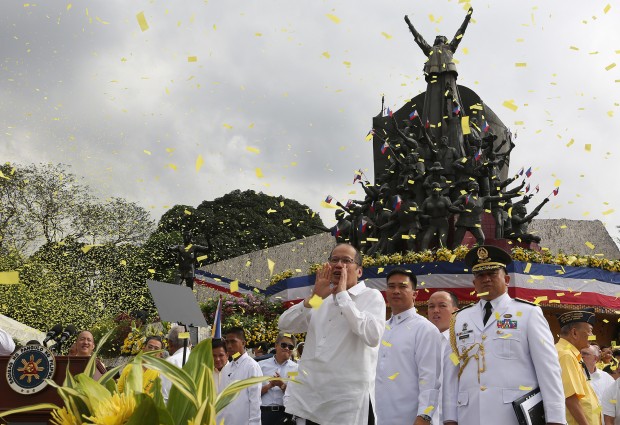
President Benigno Aquino lll waves and shouts “Thank you!” to the crowd as he leaves the People Power monument during the 30th anniversary celebration of the Edsa revolution. JOAN S. BONDOC
NOBODY is asking President Aquino to apologize for the slaughter by troops near the Palace gate of 13 farmers demanding agrarian reform a year into the presidency of his mother.
“Let’s face it. Every administration has its share of faults. He is not being asked to apologize for the Mendiola Massacre because we all know he had nothing to do with it,” said Rep. Jonathan de la Cruz of the Abakada party-list group, the campaign manager of Sen. Ferdinand Marcos Jr., who is running for Vice President in the May 9 elections.
De la Cruz was reacting to Mr. Aquino’s tirade against the son and namesake of the dictator Ferdinand Marcos, saying that the senator had always been forthright in his remorse over people hurt by the state’s policy under his father’s rule.
Mr. Aquino, in his speech at the celebration of the 30th anniversary of the Edsa People Power Revolution, warned that Marcos could emulate his father’s despotic rule.
“Some things happened. He has said it was unfortunate they happened. He is saddened that things that shouldn’t have happened, happened,” De la Cruz said, referring to people who suffered torture, abuse and were even killed during President Marcos’ term.
De la Cruz pointed out that even if Marcos was only 15 years old when martial law was declared in 1972, the senator was facing the court cases filed against his family.
The Mendiola Massacre, or Black Thursday, happened on Jan. 22, 1987, during the term of President Corazon Aquino. Farmers who trooped to Malacañang to push for land reform Corazon Aquino had promised during her campaign were fired at by antiriot forces. Thirteen of the protesters were killed and a score of others were wounded.
De la Cruz urged Mr. Aquino to stop leading the country with “divisiveness, rancor and vengeance,” saying, “Let’s learn the lessons of Edsa properly.”
“If there is something that we should apologize [for], it’s we are sorry that we remain a nation divided 30 years after Edsa,” Marcos’ campaign manager said.
De la Cruz said Marcos had been “facing up to the challenge of the present and the future to unite and work for the benefit of the people.”
Three decades after the Edsa People Power Revolution that ousted his father, the younger Marcos was wooing voters on the campaign trail in his bid to become the country’s next Vice President.
Good shot
He has a good shot at fulfilling that ambition—polls show he is in second place among six rivals.
If he wins, that would put him one step away from the presidency his father lost in the Army-backed public uprising in February 1986 amid allegations of plunder and widespread human rights violations.
Senator Marcos made no mention of that uprising when he addressed listeners on Monday in a poor village near Manila where supporters of his father live.
Instead, he talked about how people have suffered under leaders since his father’s departure, tapping into disillusionment over persistent poverty and corruption that plague the country, as well as an ongoing Islamic insurgency in the South, obviously referring to Mr. Aquino.
“Our leaders, instead of nurturing and helping us, sowed infighting and divided us into groups,” Marcos told the crowd of a few hundred villagers, many of whom chanted his nickname, Bongbong, and wore red, the color associated with his family.
“I’m fighting to start a movement to unite the Filipino people,” he said on a sparse stage, where he stood with a handful of local town officials, a far cry from the scenes of his family’s heyday.
Marcos, 58, appears to have a strong following among younger generations who did not witness abuses during the 1972-81 period of martial law under his father or the popular revolt that overthrew him.
When asked if he would eventually seek the presidency, he refuses to answer categorically but has not ruled it out. With a report from AP